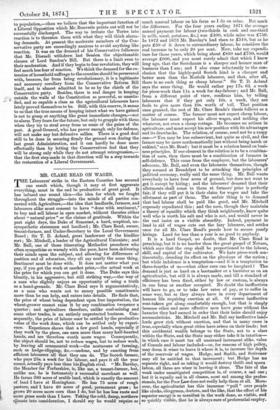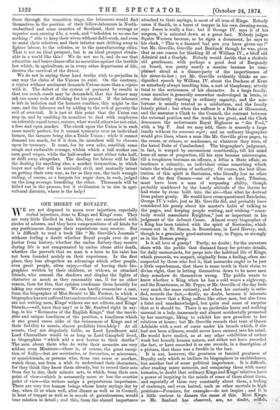mR. GLARE RP,A 11 ON WAGES..
THE Labourers' strike in the Eastern Counties has secured
one result which, though it may at first aggravate everything, must in the end be productive of great good. It has infused one sound idea—the idea for which we fought throughout the struggle—into the minds of all parties con- nected with Agriculture,—the idea that landlords, farmers, and labourers alike must consent to have "done with sentiment,' to buy and sell labour in open market, without theories either about "natural price" or the claims of gratitude. Within the past eight days, the Duke of Somerset, a hard, sceptical, un- sympathetic statesman and landlord ; Mr. Clare Read, owner, tenant-farmer, and Under-Secretary to the Local Government Board ; Sir T. D. Acland, great landowner of the kindlier sort; Mr. Mitchell, a leader of the Agricultural Unionists; and Mr. Ball, one of those itinerating Methodist preachers who often sympathise so warmly with the poor, have been delivering their minds upon the subject, and allowing for differences of position and of education, they all say nearly the same thing. Sentiment must be done with. It does not matter what you pay, if you get the work at market price,—the actual work at the price for which you can get it done. The Duke says this bluntly, in his aggressive, but still striking way,—the way of a man who slightly enjoys an opportunity of using a truth as a hand-grenade. Mr. Clare Read says it argumentatively, as a man who wants not to annoy possible constituents more than he can help, and enters into details. He finds that, the price of wheat being dependent upon free importation, the wheat-grower cannot raise it by any combination twopence a quarter; and agriculture therefore, unlike coal-mining and some other trades, is an entirely unprotected business. Con- sequently, the price of labour must be settled by the productive value of the work done, which can be settled only by experi- ence. Experience shows that a few good hands, especially if they work by the piece, can earn more than many half-hearted hands, and are therefore worth more wages. Consequently, the object should be, not to reduce wages, but to reduce work, by leaving all ornamental work—the neatnesses of farming, such as hedge-clipping, &c.—undone, and by exacting from efficient labourers all that they can do. The Scotch fanner, who pays 25s. a week for his labour, and pays it all the year round, actually pays less than hisEnglish rival. "Mr. Barclay, the Member for Forfarshire, is, like me, a tenant-fanner, but, unlike me, he is fortunately a successful merchant as well. He farms 380 acres of arable land, which is exactly the amount of land I have at Honingham. He has 75 acres of rough pasture, and I have 40 acres of good, permanent grass ; he grows 20 acres more corn than I do, but he has less roots and more grass seeds than I have. Taking the cold, damp, northern climate into consideration, I should say he would require as much manual labour on his farm as I do on mine. But mark the difference. For the four years ending 1871 the average annual payment for labour (two-thirds in cash and one-third in milk, meal, potatoes, &c.) was £400, while mine was £750. In 1872 and 1873 Mr. Baralay's had risen to £510, but as he puts £30 of it down to extraordinary labour, he considers the real increase to be only 20 per cent: Now, take my expendi- ture for those years, which being about £850 and £750, would average £800, and you must surely admit that which I knew long ago, that the Scotchman is a sharper and keener man of business than I am ; and I also come reluctantly to the con- clusion that the highly-paid Scotch hind is a cheaper and better man than the Norfolk labourer, and that, after all, there is no such thing as cheap labour." Sir T. D. Acland says the same thing. He would rather pay 17s. 6d. a week for piece-work than 1 is. a week for day-labour ; and Mr. Ball, from a different point of view, confirms him, by telling labourers that if they get only 10s. a week, they are fools to give more than 10s. worth of toil. That position once granted, the rest of Mr. Clare Reade's thesis follows as a matter of course. The fanner must not expect cheap labour, the labourer must expect his silver wages, and nothing else whatever, not even a cheap cottage. He becomes an artisan in agriculture, and must accept his new position with its advantages and its drawbacks. The relation, of course, need not be a raspy one—" You may be less subservient, but quite as civil, and the fanner may be more mathematically just without being harsh or unkind," says Mr. Read ; but it must be a relation based on busi- ness principles. If one element in the relation is to be a combina- tion of men, then there must be a combination of farmers in self-defence. This came from the employer, but the labourers' advocate, Mr. Ball, and even the labourers themselves, though they seemed at Broadclyst to be attacking the principles of political economy, really said the same thing. Mr. Ball wants everybody to have four acres of ground, but does not want to get it except by hiring ; and the labourers' demand that their allotments shall come to them at farmers' price is perfectly fair, if they will put it in their claim for wages and take the allotment as part of them. The unfair thing is to demand that bad labour shall be paid like good, and Mr. Mitchell expressly repudiated this ; and the men, though they maintain a theory of equality which they think neighbourly, know quite well who is worth his salt and who is not, and would never in the end insist on a visible absurdity. Indeed, payment in land in aid of wages cuts out the lazy labourer, and settles once for all Mr. Clare Read's puzzle how to secure yearly hirings. Land for less than a year is no good to anybody.
it is a hard Gospel, no doubt, that Mr. Clare Read is preaching, but it is no harder than the great gospel of Nature, which says that the crop shall be proportioned to the labour, skill, and capital of the cultivator. We hate piece-work sen- timentally, dreading its effect on the physique of the nation ; but while indolence is a temptation—and it is a temptation to three-fourths of us—what other cure can be imagined ? The demand is just as hard on a bootmaker or a barrister as on an agriculturist, but still it is always made, and till a standard of efficiency has been fixed, either by law or custom, is always in one form or another accepted. No doubt the ineffectives will have to go, or to take low rates of pay, or to suffer in some way, but so they always have in every department of human life requiring exertion at all. Of course ineffective rent-takers get along comfortably enough, but that is simply because other and more effective men have gone without the luxuries they had earned in order that their heirs should enjoy accumulations. Mr. Mitchell and Mr. Ball say ineffective land- lords grow rich without exertion, and that in many cases is true, especially when great cities have arisen on their lands; but this accidental wealth belongs to the State, not to a class within the State, and the State may either take it in taxation— in which case it must tax all unearned increment alike, value of Consols and labour included—or, for reasons of high policy, may deem it wiser to leave it where it is, to increase the depth of the reservoir of wages. Hodge, and Smith, and Scrivener may all be entitled to that increment; but Hodge has no separate right, and as taking it would destroy thrift and speca lation, all three are wiser in leaving it alone. The fate of the weak under unmitigated competition is, of course, a sad one ; but it is equally sad in all classes, most sad among the profes- sionals, for the Poor Law does not really help them at all. More- over, the agriculturist has this immense " pull " over people like clerks, clergymen, doctors, and the like, that the effect of his superior energy is so manifest in the work done, so visible, and so quickly visible, that he is always sure of preferential employ.
Once through the transition stage, the labourers would find themselves in the position of their fellow-labourers in North- umberland and some counties of Scotland, their average or superior men earning 25s. a week, and "beholden to no one for nothing ;" able to keep their wives without field-work, and even to assist their relatives, and their inferior men drifting away to lighter labour, to the colonies, or to the manufacturing cities. That is not an ideal prospect, but is an ideal prospect obtain- able in a world like this? We do not see it, and do see that education and benevolence offer no securities against the terrible law which, in agriculture, as in every other department of life, decrees the survival of the fittest.
We do not in saying these hard truths wish to prejudice in any way the claim of the Unions to exist. On the contrary, a regime without sentiment demands Unions more than a re'gime with it. The defect of the system of payment by results is that too much result may be demanded, that the farmer may ask too many rods of ditching for his pound. If the labourer is left in isolation and the farmers combine, this might be the case, and the labourer end by adding to the evil o,f poverty the evil of over-toil. It is just at this point that the Union can step in, and by enabling its members to deal with employers on tolerably equal terms, restore, what would otherwise not exist, a free and open market. The check upon the Union is in such cases nearly perfect, for it cannot tyrannise over an individual farmer, the farmers being also a Trade Union ; while it cannot demand too much, for if it does, its members will be thrown upon its treasury. It must, for its own sake, establish some rough and endurable average, within which a full worker can earn good wages, while the half-worker must either take half, or drift away altogether. The dealing for labour will be like the dealing for anything else, a market transaction, in which buyer and seller will be mutually civil, and mutually intent on ,getting their own way, as far as they can, the tacit wrangle ending, of course, as a bargain for sugar does, in each, judged on the long average, benefiting the other. Thousands will be killed out in the process, but if civilisation is to rise in agri- cultural districts, where is the help I



































 Previous page
Previous page